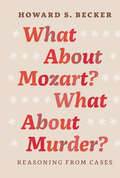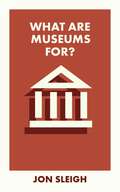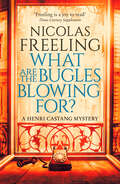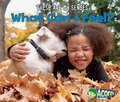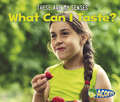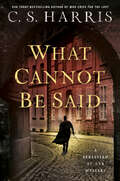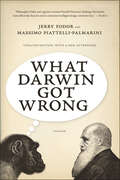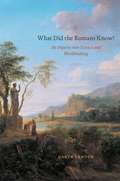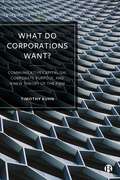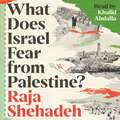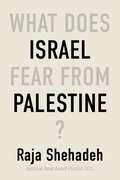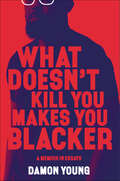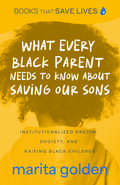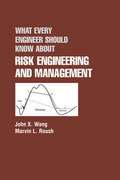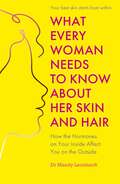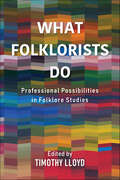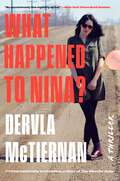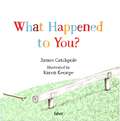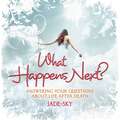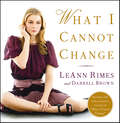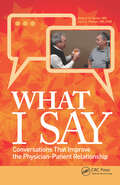- Table View
- List View
What a Woman Wants: Contains The Playa's Handbook, No More Playas, What A Woman Wants (Playas Series #3)
by Brenda JacksonAfter a close friend commits suicide, Faith, Monique, and Shannon head to the beach cottage on Hilton Head Island. Determined to heed her advice and make the most of their lives, they make a pact to spend the summer embracing new adventures. They also embrace new men and a new best friend along the way.Filled with profound passion and sensuality, witty dialogue and richly drawn characters, this is a story of women having fun, embracing life, taking charge, and doing the things they want –and discovering in the process that everyone deserves to kick the routine every once in a while, let their hair down and explore new things. And if the right man comes along, especially one who is willing to make an already hot summer even hotter, then pushing the envelope just might give her life the jolt it needs.
What About Mozart? What About Murder?: Reasoning From Cases
by Howard S. BeckerIn 1963, Howard S. Becker gave a lecture about deviance, challenging the then-conventional definition that deviance was inherently criminal and abnormal and arguing that instead, deviance was better understood as a function of labeling. At the end of his lecture, a distinguished colleague standing at the back of the room, puffing a cigar, looked at Becker quizzically and asked, “What about murder? Isn’t that really deviant?” It sounded like Becker had been backed into a corner. Becker, however, wasn’t defeated! Reasonable people, he countered, differ over whether certain killings are murder or justified homicide, and these differences vary depending on what kinds of people did the killing. In What About Mozart? What About Murder?, Becker uses this example, along with many others, to demonstrate the different ways to study society, one that uses carefully investigated, specific cases and another that relies on speculation and on what he calls “killer questions,” aimed at taking down an opponent by citing invented cases. Becker draws on a lifetime of sociological research and wisdom to show, in helpful detail, how to use a variety of kinds of cases to build sociological knowledge. With his trademark conversational flair and informal, personal perspective Becker provides a guide that researchers can use to produce general sociological knowledge through case studies. He champions research that has enough data to go beyond guesswork and urges researchers to avoid what he calls “skeleton cases,” which use fictional stories that pose as scientific evidence. Using his long career as a backdrop, Becker delivers a winning book that will surely change the way scholars in many fields approach their research.
What Are Museums For? (What Is It For?)
by Jon SleighThe days when museums were dusty, stuffy institutions displaying their wealth and wisdom to a reverential public are over. Museums today are a cultural battleground. Who should decide what is put on display and how it is presented? Who gets to set the narrative? In this passionately argued book, Jon Sleigh maintains that museums must be for all people and inclusion must be at the heart of everything they do. But what does good inclusion look like in practice? Cleverly structured like a museum tour, Sleigh uses seven illustrative museum objects from seven very different museums to explore such wide-ranging issues as trust-building, representation, digital access, conflicting narratives, removal from display and restitution.
What Are the Bugles Blowing For? (The Henri Castang Mysteries)
by Nicolas FreelingFrom an Edgar Award–winning British crime novelist, this unsettling homicide investigation features the unorthodox French detective Henri Castang.On a sultry summer night in a French provincial city, Insp. Henri Castang is summoned from his office at the Police Judiciaire to the site of a triple murder. The killer? A husband who came home unexpectedly to discover his wife and daughter in bed with another man. A crime of passion? Perhaps. Except the murderer in question, wealthy financier Gilbert La Touche, is cool and remote. His confession is as factual and bloodless as the crime is violent and deeply disturbing. As a detective, Castang must play by the rules to protect himself. But for an unconventional cop like Castang, that is virtually impossible. After all, there’s more to murder than a few corpses and a killer, and Castang will follow every twist until he gets to the heart of the evil at hand.Praise for Nicolas Freeling“Nicolas Freeling . . . liberated the detective story from page-turning puzzler into a critique of society and an investigation of character.” —The Daily Telegraph“Freeling rewards with his oblique, subtly comic style.” —Publishers Weekly
What Can I Feel? (These Are My Senses Ser.)
by Joanna IssaThis book takes a very simple look at children's sense of touch. Leveled text with repeated use of high frequency words makes the book perfect for beginning readers, while bright, colorful photographs complement the text and maintain readers' interest.
What Can I Taste? (These Are My Senses Ser.)
by Joanna IssaThis book takes a very simple look at children's sense of taste. Leveled text with repeated use of high frequency words makes the book perfect for beginning readers, while bright, colorful photographs complement the text and maintain readers' interest.
What Can You See in Summer? (Seasons Ser.)
by Sian SmithBooks in this series introduce emergent readers to the four seasons. In Summer, children are taken on a tour of things they can see in summer including typical summer activities and changes in the natural world. Beautiful photos, very simple repeated text, high frequency and decodeable words and strong photo-to-text matching make this a perfect book for early readers to enjoy.
What Cannot Be Said (Sebastian St. Cyr Mystery #19)
by C. S. HarrisA seemingly idyllic summer picnic ends in a macabre murder that echoes a pair of slayings fourteen years earlier in this riveting new historical mystery from the USA Today bestselling author of Who Cries for the Lost.July 1815: The Prince Regent&’s grandiose plans to celebrate Napoléon&’s recent defeat at Waterloo are thrown into turmoil when Lady McInnis and her daughter Emma are found brutally murdered in Richmond Park, their bodies posed in a chilling imitation of the stone effigies once found atop medieval tombs. Bow Street magistrate Sir Henry Lovejoy immediately turns to his friend Sebastian St. Cyr, Viscount Devlin, for help with the investigation. For as Devlin discovers, Lovejoy&’s own wife and daughter were also murdered in Richmond Park, their bodies posed in the same bizarre postures. A traumatized ex-soldier was hanged for their killings. So is London now confronting a malicious copyist? Or did Lovejoy help send an innocent man to the gallows?Aided by his wife, Hero, who knew Lady McInnis from her work with poor orphans, Devlin finds himself exploring a host of unsavory characters from a vicious chimney sweep to a smiling but decidedly lethal baby farmer. Also coming under increasing scrutiny is Sir Ivo McInnis himself, along with a wounded Waterloo veteran—who may or may not have been Laura McInnis&’s lover—and a charismatic young violinist who moonlights as a fencing master and may have formed a dangerous relationship with Emma. But when Sebastian&’s investigation turns toward man about town Basil Rhodes, he quickly draws the fury of the Palace, for Rhodes is well known as the Regent&’s favorite illegitimate son.Then Lady McInnis&’s young niece and nephew are targeted by the killer, and two more women are discovered murdered and arranged in similar postures. With his own life increasingly in danger, Sebastian finds himself drawn inexorably toward a conclusion far darker and more horrific than anything he could have imagined.
What Darwin Got Wrong
by Jerry Fodor Massimo Piattelli-PalmariniWhat Darwin Got Wrong is a remarkable book, one that dares to challenge the theory of natural selection as an explanation for how evolution works---a devastating critique not in the name of religion but in the name of good science. Combining the results of cutting-edge work in experimental biology with crystal-clear philosophical arguments, Fodor and Piattelli-Palmarini mount a reasoned and convincing assault on the central tenets of Darwin's account of the origin of species. This is a concise argument that will transform the debate about evolution and move us beyond the false dilemma of being either for natural selectionor against science.
What Did the Romans Know?: An Inquiry into Science and Worldmaking
by Daryn LehouxWhat did the Romans know about their world? Quite a lot, as Daryn Lehoux makes clear in this fascinating and much-needed contribution to the history and philosophy of ancient science. Lehoux contends that even though many of the Romans’ views about the natural world have no place in modern science—the umbrella-footed monsters and dog-headed people that roamed the earth and the stars that foretold human destinies—their claims turn out not to be so radically different from our own. Lehoux draws upon a wide range of sources from what is unquestionably the most prolific period of ancient science, from the first century BC to the second century AD. He begins with Cicero’s theologico-philosophical trilogy On the Nature of the Gods, On Divination, and On Fate, illustrating how Cicero’s engagement with nature is closely related to his concerns in politics, religion, and law. Lehoux then guides readers through highly technical works by Galen and Ptolemy, as well as the more philosophically oriented physics and cosmologies of Lucretius, Plutarch, and Seneca, all the while exploring the complex interrelationships between the objects of scientific inquiry and the norms, processes, and structures of that inquiry. This includes not only the tools and methods the Romans used to investigate nature, but also the Romans’ cultural, intellectual, political, and religious perspectives. Lehoux concludes by sketching a methodology that uses the historical material he has carefully explained to directly engage the philosophical questions of incommensurability, realism, and relativism. By situating Roman arguments about the natural world in their larger philosophical, political, and rhetorical contexts, What Did the Romans Know? demonstrates that the Romans had sophisticated and novel approaches to nature, approaches that were empirically rigorous, philosophically rich, and epistemologically complex.
What Do Corporations Want?: Communicative Capitalism, Corporate Purpose, and a New Theory of the Firm
by Timothy Kuhn'Corporate purpose' has become a battleground for stakeholders’ competing desires. Some argue that corporations must simply generate profit; others suggest that we must make them create social change.Leading organization studies scholar Timothy Kuhn argues that this 'either/or' thinking dramatically oversimplifies matters: today’s corporations must be many things, all at once.Kuhn offers a bold new Communicative Theory of the Firm to highlight the authority that creates corporations’ identities and activities. The theory provides a roadmap for navigating that battleground of competing desires to produce more responsive corporations.Drawing on communicative and new materialist theorizing, along with three insightful case studies, this book thoroughly redefines our understandings of what corporations are 'for'.
What Does Israel Fear from Palestine?
by Raja ShehadehWhen the state of Israel was formed in 1948, it precipitated the Nakba or 'disaster': the displacement of the Palestine nation, creating fracture-lines which continue to erupt in violent and tragic ways today.In the years that followed, while the Berlin Wall crumbled and South Africa abolished apartheid, the Israeli government rejected every opportunity for reconciliation with Palestine. But Raja Shehadeh, human rights lawyer and Palestine's greatest living writer, suggests that this does not mean the two nations cannot work together aspartners on the road to peace, not genocide.In graceful, devastatingly observed prose, this is a fresh perspective for a time of great need.Medical Aid for Palestinians (MAP) is a registered charity in the UK with charity no. 1045315.A portion of the proceeds* received by Profile Books from this audiobook will be given to the charity for their work for the health and dignity of Palestinians living under occupation and as refugees. This donation has been made possible by the author Raja Shehadeh, Refaat Alareer, Khalid Abdalla and Profile Books.*Proceeds means the cash-price or cash-equivalent price less sales taxes.
What Does Israel Fear From Palestine?
by Raja ShehadehA poignant, incisive meditation on Israel&’s longstanding rejection of peace, and what the war on Gaza means for Palestinian and Israeli futures.When apartheid in South Africa ended in 1994, dismantled by internal activism and global pressure, why did Israel continue to pursue its own apartheid policies against Palestinians? In keeping with a history of antagonism, the Israeli state accelerated the establishment of settlements in the Occupied Territories as extreme right-wing voices gained prominence in government, with comparatively little international backlash.Condensing this complex history into a lucid essay, Raja Shehadeh examines the many lost opportunities to promote a lasting peace and equality between Israelis and Palestinians. Since the creation of Israel in 1948, known to Palestinians as the Nakba, or catastrophe, each side&’s perception of events has strongly diverged. What can this discrepancy tell us about Israel&’s undermining of a two-state solution? And will the current genocide in Gaza finally mark a shift in the world&’s response? With graceful, haunting prose, Shehadeh offers insights into a defining conflict that could yet be resolved.
What Doesn't Kill You Makes You Blacker: A Memoir in Essays
by Damon YoungA Finalist for the NAACP Image AwardA Finalist for the Hurston/Wright Legacy Award for NonfictionA Finalist for the Thurber Prize for American HumorLonglisted for the PEN/Diamonstein-Spielvogel Award for the Art of the EssayAn NPR Best Book of the YearA Washington Independent Review of Books Favorite of the YearFrom the host of podcast "Stuck with Damon Young," cofounder of VerySmartBrothas.com, and one of the most read writers on race and culture at work today, a provocative and humorous memoir-in-essays that explores the ever-shifting definitions of what it means to be Black (and male) in AmericaFor Damon Young, existing while Black is an extreme sport. The act of possessing black skin while searching for space to breathe in Americais enough to induce a ceaseless state of angst where questions such as “How should I react here, as a professional black person?” and “Will this white person’s potato salad kill me?” are forever relevant.What Doesn’t Kill You Makes You Blacker chronicles Young’s efforts to survive while battling and making sense of the various neuroses his country has given him.It’s a condition that’s sometimes stretched to absurd limits, provoking the angst that made him question if he was any good at the “being straight” thing, as if his sexual orientation was something he could practice and get better at, like a crossover dribble move or knitting; creating the farce where, as a teen, he wished for a white person to call him a racial slur just so he could fight him and have a great story about it; and generating the surreality of watching gentrification transform his Pittsburgh neighborhood from predominantly Black to “Portlandia . . . but with Pierogies.” And, at its most devastating, it provides him reason to believe that his mother would be alive today if she were white.From one of our most respected cultural observers, What Doesn’t Kill You Makes You Blacker is a hilarious and honest debut that is both a celebration of the idiosyncrasies and distinctions of Blackness and a critique of white supremacy and how we define masculinity.
What Every Black Parent Needs to Know About Saving Our Sons: Institutionalized Racism, Society, and Raising Black Children (Books That Save Lives)
by Marita GoldenEmpower Your Sons Against Institutionalized Racism“One of the most important pieces of literature for Black parents.”—MJ Fievre, author of Raising Confident Black KidsA powerful guide to navigate the challenges of raising families in turbulent times. In What Every Black Parent Needs to Know about Saving Our Sons, gain profound advice on how to protect and nurture Black teen boys.Essential knowledge, practical guidance. With intimate storytelling of her own son’s story and in-depth research against the chilling backdrop of racially motivated brutality, acclaimed author Marita Golden reveals alarming statistics and systemic issues affecting children of color—and remedies.A powerful and timely resource, What Every Black Parent Needs to Know about Saving Our Sons addresses pressing issues of today with new material and updated resources. Wisdom from psychologists, writers, and young Black men initiates meaningful discussions and delves into the complexities of Black parenting. Tackle topics such as generational trauma, being Black in white spaces, institutionalized racism, gun violence and how to not get shot, supporting mental health for black men, and other problems Black kids face. Embark on a transformative journey towards raising confident, successful, and resilient kids.Inside, find:Realities faced by Black families and the importance of teaching kids about racismGuidance to navigate, discuss, and explore the impact of fearing the black bodyConversations and strategies to keep our kids safe and growing up greatIf you liked The Light We Carry, Decoding Boys, Three Mothers, or American Carnage, you’ll love What Every Black Parent Needs to Know about Saving Our Sons.
What Every Engineer Should Know About Risk Engineering and Management (ISSN #Vol. 36)
by John X. Wang Marvin L. Roush"Explains how to assess and handle technical risk, schedule risk, and cost risk efficiently and effectively--enabling engineering professionals to anticipate failures regardless of system complexity--highlighting opportunities to turn failure into success."
What Every Woman Needs to Know About Her Skin and Hair: How the hormones on your inside affect you on the outside
by Dr Mandy LeonhardtThe appearance of our skin and hair has a huge impact on our psychological wellbeing and confidence. Women feel pressure to have glowing, blemish-free skin, and thick, luscious hair at all times - in reality, our skin is a dynamic living organ which reacts to hormonal changes across the lifecycle, from puberty to the menopause. When our skin does not look healthy, and when our hair is thin or falling out, we want to understand why, and what we can do about it. We can spend large amounts on different creams and beauty products, or cover the problem with makeup, but ultimately the question most asked by women, and unanswered by skincare regimes, is 'could this be hormonal?'The answer is, of course, 'yes' - and if you read this book, you'll know exactly how and why. By giving you a better understanding of the relationship between your hormones, and common skin and hair problems, Dr Mandy Leonhardt will help you find lasting solutions whatever your issue. Whether you suffer with outbreaks, dry skin, sensitive skin, pigmentation or are concerned about the way your skin is aging in midlife, What Every Woman Needs to Know About Her Skin and Hair will provide you with the tools to find more holistic and effective solutions which don't just scratch (or moisturise) the surface, but which look at the root cause of the problem. Drawing on both the latest research and on her years of experience as a GP and specialist in women's health, Dr Leonhardt offers scientifically proven and practical advice to both understand and better manage the condition of your skin, hair and nails. She will explain which skincare principles (and types of product) are worthwhile, and which aren't; and how you can effectively connect the dots between your skin health and factors like nutrition and lifestyle. She gives clear advice on which non-medical treatments are worth pursuing (and, again, which aren't), and plenty of additional resources to help you find a cost-effective regime which takes both your hormonal stage in life and your bank balance into account.
What Every Woman Needs to Know About Her Skin and Hair: How the hormones on your inside affect you on the outside
by Dr Mandy LeonhardtThe appearance of our skin and hair has a huge impact on our psychological wellbeing and confidence. Women feel pressure to have glowing, blemish-free skin, and thick, luscious hair at all times - in reality, our skin is a dynamic living organ which reacts to hormonal changes across the lifecycle, from puberty to the menopause. When our skin does not look healthy, and when our hair is thin or falling out, we want to understand why, and what we can do about it. We can spend large amounts on different creams and beauty products, or cover the problem with makeup, but ultimately the question most asked by women, and unanswered by skincare regimes, is 'could this be hormonal?'The answer is, of course, 'yes' - and if you read this book, you'll know exactly how and why. By giving you a better understanding of the relationship between your hormones, and common skin and hair problems, Dr Mandy Leonhardt will help you find lasting solutions whatever your issue. Whether you suffer with outbreaks, dry skin, sensitive skin, pigmentation or are concerned about the way your skin is aging in midlife, What Every Woman Needs to Know About Her Skin and Hair will provide you with the tools to find more holistic and effective solutions which don't just scratch (or moisturise) the surface, but which look at the root cause of the problem. Drawing on both the latest research and on her years of experience as a GP and specialist in women's health, Dr Leonhardt offers scientifically proven and practical advice to both understand and better manage the condition of your skin, hair and nails. She will explain which skincare principles (and types of product) are worthwhile, and which aren't; and how you can effectively connect the dots between your skin health and factors like nutrition and lifestyle. She gives clear advice on which non-medical treatments are worth pursuing (and, again, which aren't), and plenty of additional resources to help you find a cost-effective regime which takes both your hormonal stage in life and your bank balance into account.
What Folklorists Do: Professional Possibilities in Folklore Studies
by Timothy LloydWhat can you do with a folklore degree? Over six dozen folklorists, writing from their own experiences, show us. What Folklorists Do examines a wide range of professionals—both within and outside the academy, at the beginning of their careers or holding senior management positions—to demonstrate the many ways that folklore studies can shape and support the activities of those trained in it. As one of the oldest academic professions in the United States and grounded in ethnographic fieldwork, folklore has always been concerned with public service and engagement beyond the academy. Consequently, as this book demonstrates, the career applications of a training in folklore are many—advocating for local and national causes; shaping public policy; directing and serving in museums; working as journalists, publishers, textbook writers, or journal editors; directing national government programs or being involved in historic preservation; teaching undergraduate and graduate students; producing music festivals; pursuing a career in politics; or even becoming a stand-up comedian. A comprehensive guide to the range of good work carried out by today's folklorists, What Folklorists Do is essential reading for folklore students and professionals and those in positions to hire them.Audio book narrated by Walter Brown. Produced by Speechki in 2021.
What Happened to Nina?: A Thriller
by Dervla McTiernanFrom the #1 internationally bestselling author of The Murder Rule comes an emotional novel of suspense about two families at war.Nina and Simon are the perfect couple. Young, fun and deeply in love. Until they leave for a weekend at his family’s cabin in Vermont, and only Simon comes home.WHAT HAPPENED TO NINA?Nobody knows. Simon’s explanation about what happened in their last hours together doesn’t add up. Nina’s parents push the police for answers, and Simon’s parents rush to protect him. They hire expensive lawyers and a PR firm that quickly ramps up a vicious, nothing-is-off-limits media campaign.HOW FAR WILL HIS FAMILY GO TO KEEP HIM SAFE?Soon, facts are lost in a swirl of accusation and counter-accusation. Everyone chooses a side, and the story goes viral, fueled by armchair investigators and wild conspiracy theories and illustrated with pretty pictures taken from Nina’s social media accounts. Journalists descend on their small Vermont town, followed by a few obsessive "fans."HOW FAR WILL HER FAMILY GO TO GET TO THE TRUTH?Nina’s family is under siege, but they never lose sight of the only thing that really matters — finding their daughter. Out-gunned by Simon’s wealthy, powerful family, Nina’s parents recognize that if playing by the rules won’t get them anywhere, it’s time to break them.
What Happened to You
by James CatchpoleA Schneider Family Book Award Honor book! This accessible, funny, and groundbreaking story addresses the questions children often ask, as well as a disabled child's choice not to answer. What happened to you? Was it a shark? A burglar? A lion? Did it fall off? A boy named Joe is trying to play pirates at the playground, but he keeps being asked what happened to his leg. Bombarded with questions and silly suggestions, Joe becomes more and more fed up...until the kids finally understand they don't need to know what happened. And that they're wasting valuable playtime! Based on the author's real childhood experiences, this honest, funny, and authentic picture book is an empowering read for anyone with a disability, and for young readers learning how best to address differences.
What Happens Next? (What Happens Next? Ser.)
by Jade-SkyHerbs can heal, comfort and nourish and they hold ancient energies that people have used throughout time to create magick spells. This same magickal power in nature is yours to explore with everyday sacred herbs so that you may also facilitate change and find the support and inspiration you are seeking. Along with 60 sacred herb spells from Cheralyn Darcey&’s personal nature grimoire, The Book of Herb Spells features spellcasting and spellcrafting basics, magickal gardening, supply sourcing and dedicated lessons on how to write and cast your own spells. To complete your treasury of herb nature magick, a beautifully illustrated personal grimoire journal section is provided to keep your own bespoke herbs spells.
What He Desired
by Eva HoreMichael and Sarah are a normal married couple. Or are they? What happens when fantasy and reality cross?This couple finds out that pleasing each other with different scenarios might not be what they are really yearning for. Michael puts pen to paper and gets more than he bargained for when Sarah finds his hidden manuscript ...
What I Cannot Change
by Darrell Brown LeAnn RimesBillboard hits come and go, but once in a blue moon a song comes along that captures people's hearts and stands the test of time. Country / Pop sensation LeAnn Rimes' "What I Cannot Change" released to radio in August 2008 and immediately topped the charts. The song's simple message of peace and acceptance speaks to people from all walks of life:I will learn to let go what I cannot changeI will learn to forgive what I cannot changeI will learn to love what I cannot changeBut I will change, I will changeWhatever I, whenever I canThe book WHAT I CANNOT CHANGE is an elegant counterpart to the song that will include an introduction by Rimes, lyrics, interior photographs, stories from people who have experienced their own journeys of change.
What I Say: Conversations That Improve the Physician-Patient Relationship
by Jack Parker Robert OsherPhysicians of all disciplines know (or quickly learn the hard way) that effective and compassionate communication is arguably the single most important determinant of patient satisfaction. For cataract surgeons, the words said before, after, and even during the operation are often more important to the patient’s happiness than the objective quality of the surgical result.What I Say: Conversations that Improve the Physician-Patient Relationship is designed to help cataract surgeons to hone their verbal interactions to be as sharp as their surgical skills. Muddled, clumsy, or impromptu explanations diminish the doctor-patient relationship and could prevent patients from receiving the surgery they need or appreciating the results they get. Knowing in advance which words to use in difficult situations is analogous to knowing how to manage a complication before it occurs. The results are inevitably better when a physician has considered every possible outcome instead of attempting to come up with exactly the right solution on the spot. Rather than figure out the right words by trial and error, however, What I Say has recommendations on exactly what to say to build strong and trusting patient relationships. Drs. Robert Osher and Jack Parker have compiled conversational scripts from Dr. Osher’s 40-year career in ophthalmology, as well as contributions from over a dozen international mavens of bedside manner into a strategy guide through even the most difficult patient conversations that inevitably surround cataract surgery.Topics include: Lowering Expectations for Spectacle-Free Vision The Torn Posterior Capsule Postoperative Refractive Surprise The Dropped Nucleus The Unhappy Patient Despite a Good Result Containing examples of conversations with cataract surgery patients where informing and reassuring take top priority, What I Say: Conversations that Improve the Physician-Patient Relationship was created to aid cataract surgeons in their pre-operative, intra-operative, and post-operative interactions with patients. With the advice contained inside, surgeons will be able to motivate patients, calibrate expectations, and diffuse frustrations in every possible scenario.

